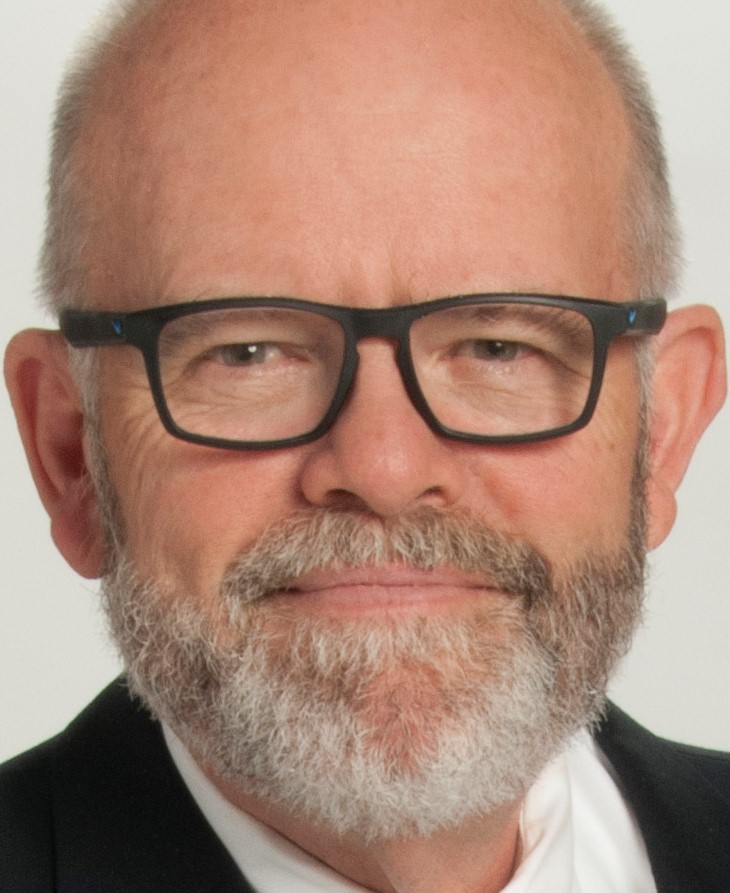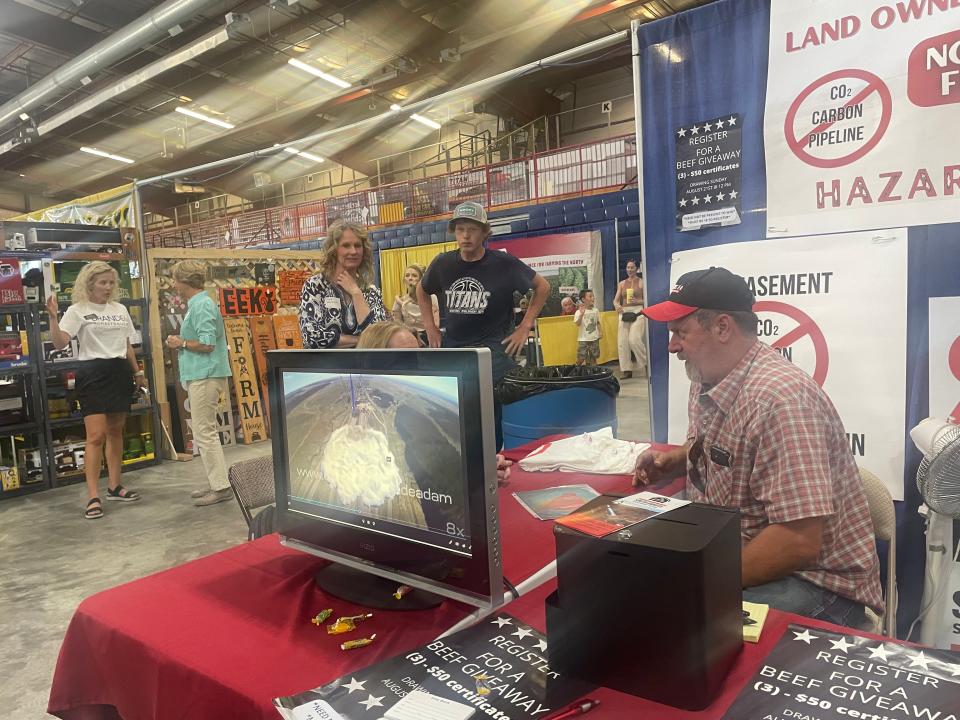South Dakota politicians, candidates hear from constituents about carbon dioxide pipeline proposal

A private company's use of eminent domain for the development of a carbon dioxide pipeline is a big issue for Public Utilities Commission candidate Jeff Barth.
And other South Dakota candidates and politicians are also well aware of the issue, having heard from constituents across the state.
The prospect of carbon dioxide sequestration pipelines, particularly one planned by Summit Carbon Solutions, was a topic of discussion when politicians made stops in Aberdeen last week.
More: Landowners in 7 more South Dakota counties file complaints against Summit Carbon Solutions
During the Brown County Fair, Barth, 70, a Democrat from Sioux Falls, visited with folks near a booth sponsored by landowners opposed to the use of eminent domain for the development of a pipeline
The Summit pipeline would start in Iowa and run through five states, including South Dakota, before ending in western North Dakota. It would connect with ethanol plants to capture carbon dioxide emissions and convert them to a supercritical state, which is between a liquid and a gas, which would ultimately be sequestered underground..
Barth feels his experience would benefit PUC
Barth is finishing up his fourth, four-year term on the Minnehaha County Commission and previously worked for 38 years with Northwestern Bell.
"I feel like I have a lot of qualifications for the Public Utilities Commission," he said
In explaining eminent domain, Barth said it gives the government the ability to seize control of private land, often for the development of a highway. In the case of this pipeline, though, it would be used to benefit a private company. He sees the carbon dioxide pipeline as a chemical pipeline carrying a dangerous material.
Barth is challenging incumbent commissioner Chris Nelson, who has served on the PUC since he was appointed and subsequently re-elected in 2011.
More: PUC approves Summit Carbon Solutions' request for a permit application deadline extension
"Chris Nelson is a nice guy, but he's a rubber stamp. I'm not going to be a rubber stamp," Barth said.
As a county commissioner, Barth said he's had to make tough decisions and justify his reasons. For example, he said, he opposed a request from a farmer who wanted to expand the size of one of his buildings. The building was already close to the edge of the property line, he said, and was causing an issue with snow. He wanted to allow it, but had to vote no.
Barth said he's not going to approve a carbon dioxide pipeline just because it checks all the right boxes.
There are concerns that insurance on a farm will no longer provide property coverage once the Summit line is installed and that landowners could be on the hook for repair costs if there's a break on their land after three years, he said.
Summit Carbon Solutions denies claims about insurance
Summit Carbon Solutions denies those claims. According to information from Summit's media relations department, Summit will "indemnify and hold landowners harmless for any loss, damage, claim or action resulting from the project."
The only exception, according to Summit, is gross negligence or willful misconduct.
More: A second carbon sequestration pipeline, dubbed Heartland Greenway, could be coming to South Dakota
As for property insurance, Summit noted the 11,500 miles of pipeline already in South Dakota and the fact that those property owners have been able to continue to get insurance. Those lines are for oil, natural gas and water.
"Landowners who own property where these pipelines operate have always been able to get insurance and that will continue to be the case in the future, including while our project is being constructed and once it is operational. Any claims to the contrary are not accurate," according to information from Summit.
Landowner group has concerns about use of eminent domain
Bruce Mack of Leola spent time working at the fair booth opposing eminent domain for private companies.
Mack said eminent domain is a process decided by the courts. It's also intended for use by local governments to develop infrastructure like an interstate. He said Summit is claiming its carbon dioxide pipeline will be a common carrier and is thus able to use eminent domain to get needed land.

For now, Summit is asking landowners to sign easements for the installation of the pipeline.
"We want to get eminent domain shut down," Mack said. "If Summit can get this done through voluntary easements, go for it."
To this point, Summit points to the fact that its already partnered with 1,500 landowners across the five states where this project is planned. Those partnerships include 2,400 easements. Of those agreements, more than 300 are from South Dakota farmers, according to information from Summit.
Carbon dioxide pipeline concerns raised at Farm Bill forum
Concerns about Summit's proposed pipeline also came up during a Farm Bill discussion sponsored by the South Dakota Farm Bureau. U.S. Rep. Dusty Johnson, R-S.D., attended along with policy advisors for U.S. Sen. Mike Rounds, R-S.D., and U.S. Sen. John Thune, R-S.D.
A member of the audience asked about carbon credits and companies proposing carbon dioxide pipelines that are threatening the use of eminent domain.
Johnson, who previously served as a member of the state PUC, said when it comes to the proposed CO2 pipelines, eminent domain and whether its use is appropriate is one of three issues. The second is whether a pipeline can be built safely, and Johnson believes that can be done.
The third issue is whether the concept of capturing carbon dioxide and sequestering in the ground is a good idea. Johnson said he doesn't yet have enough information to provide a good answer. He said the best course of action is to let this pipeline request go through the PUC hearing process.
More: Brown County Commission approves one-year moratorium on transmission pipelines
"If Summit doesn't meet their burden of proof they shouldn't get this permit," Johnson said.
He also noted that any PUC decision can be appealed in court.
Staff members for Rounds and Thune said public concerns about the project are being heard.
Ryan Donnelly, legislative assistant for Thune, said input received is being tracked.
Jim Selchert, agriculture specialist for Rounds, encouraged people to continue calling with their concerns, but also said he's not aware of any laws that allow the use of eminent domain for this type of project.
"They would have to get easements," he said.
Following the forum, Selchert said there aren't any federal programs that mandate capturing carbon and putting it into the ground.
Following a fair discussion about the Farm Bill with members of the Aberdeen Area Chamber of Commerce Agriculture Committee, Thune said it will be difficult to get the project off the ground until landowner and local government concerns are addressed.
"In the end, I think you still have to figure out a way to get those local entities on board. And so we're listening to the discussion around the issue," he said.
The Summit Carbon Solutions pipeline would cover about 2,000 miles and cost roughly $4.5 billion.
This article originally appeared on Aberdeen News: Prospect of eminent domain concerns Democratic PUC candidate Barth
